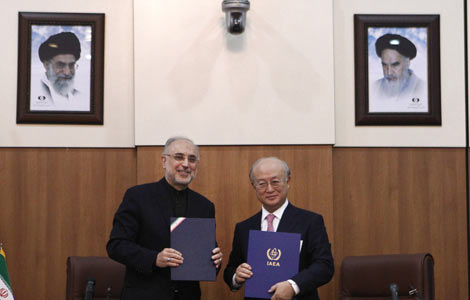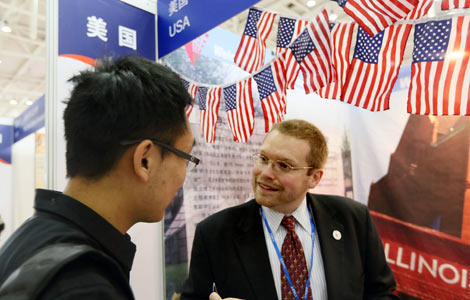From the Chinese Press
Updated: 2013-11-12 07:27
(China Daily)
|
||||||||
Higher wages for workers
An economics professor from the Capital University of Economics and Business found that people's spending power has shrunk by almost half within eight years. For most people that is not just because the value of the yuan has dropped but because they are underpaid, says an article from dahe.cn. Excerpts:
In developed countries, employees' wages generally account for about 50 percent of a company's overall costs. In China, the figure is less than 10 percent.
Also, the amount of labor remuneration in developed countries generally represents more than 55 percent of the country's national revenues. In China, the proportion is less than 42 percent. What's worse, people's incomes as a proportion of national revenue continue to show a downward trend.
The distribution of income in China has favored local governments and enterprises. For example, employees in State-owned monopolistic enterprises have enjoyed larger benefits compared with those working in small- and medium-sized private companies.
Considering the increasing costs of education, medical treatment and buying a house, no wonder people feel that their money is becoming less affordable.
Under current policies, increases in pensions and the threshold for individual income tax are both very limited.
To reverse the deepening wealth gap, the authorities have to continue carrying forward reforms to raise the proportion of earned income at the primary distribution stage. For one thing, local governments should provide policy support for ordinary employees to strive for better wages, and they need to make moves to reduce the burdens on enterprises and the public, and create more channels and space for people to increase their earnings.
Extravagant offices reflect mindset
The construction of the government office building in Changxing county, Zhejiang province, costs 2 billion yuan ($328 million); another government office building in the city of Jinan, Shandong province, costs 4 billion yuan. Such grand office buildings reflect local authorities' luxurious mindsets and ignorance of people's feelings, says an article from youth.cn. Excerpts:
Some local authorities have the wrong perception that the more extravagant their office compounds are, the more capable they seem.
But the construction of such grand office buildings has violated the central government's directives and regulations. Local authorities who build such luxurious office buildings get away with their wrongful behavior because they claim that the funds have been used for construction, and not gone into the pockets of officials. It is certainly rare that an official is investigated for constructing extravagant office buildings, even though it breaches regulations.
In fact, local officials' extravagant mindsets are not only reflected in their flashy work style, but also their deviation from the lives of ordinary people. Such behavior that goes against people's interests should be dealt with as seriously as other political misdeeds.
Governments exercise their powers for the people and they should share weal and woe with the people. To build up extravagant government office buildings using taxpayers' money obviously goes against people's interests, especially at a time when house prices are soaring and many can't afford to buy one. We must hold a "zero-tolerance" attitude towards such extravagant government buildings to prevent it from happening in the future and to nip the luxurious mindsets of officials in the bud.
To crackdown on the "four forms of decadence" namely: formalism, bureaucratism, hedonism and extravagance, such extravagant buildings should never be allowed. It is through the building up of frugality that a better image of the government will be built up in the eyes of the public.
(China Daily 11/12/2013 page9)

 Typhoon Haiyan claims 6 in S. China
Typhoon Haiyan claims 6 in S. China
 Iran to give UN inspectors more access to nuclear sites
Iran to give UN inspectors more access to nuclear sites
 In love with Yunnan
In love with Yunnan
 Online shopping gala sets records
Online shopping gala sets records
 Report shows jump in Chinese students going to the US
Report shows jump in Chinese students going to the US
 2 killed in Texas party shooting
2 killed in Texas party shooting
 Traditional retail battles websites
Traditional retail battles websites
 Singles Day becomes China's Black Friday
Singles Day becomes China's Black Friday
Most Viewed
Editor's Picks

|

|

|

|

|

|
Today's Top News
Global talent lacking in China
Journalists lead lonely-heart list
Iran to give UN inspectors more access
Reform expected to dominate talk at plenum
Real-estate bubble seen bursting
More Chinese students going to US
Online shopping gala sets records
Typhoon Haiyan claims 6 in S. China
US Weekly

|

|






